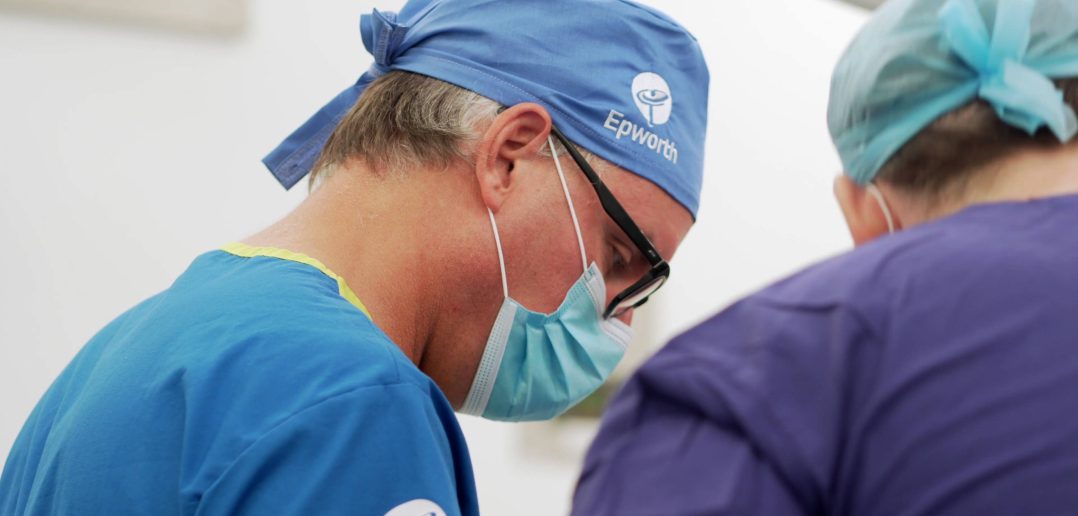Milestone for ‘life-changing’ prostate option

29/06/22
A ground-breaking treatment for prostate cancer has already helped 100 men in Victoria.
Epworth Freemasons were the first hospital in the state to introduce the minimally-invasive treatment, called focal therapy, in 2019.
Using NanoKnife technology, it treats only the cancerous part of the prostate, leaving the rest of the prostate tissue undisturbed, minimising side effects.
Epworth urologist Professor Nathan Lawrentschuk said the NanoKnife was an alternative to radical surgery or radiation for prostate cancer patients.
“Unfortunately, radical prostate cancer surgery or radiation carries side-effects in some men including erectile dysfunction and altered bladder control,” he said.
“Killing the cancer cells using the NanoKnife doesn’t affect surrounding structures, such as nerves and the bladder – it’s life-changing for men.”
The process uses Irreversible Electroporation (IRE), where a surgeon implants several small electrodes called NanoKnife around the cancerous tumour.
Electrical pulses are used to puncture nanometre-sized holes in the tumour, causing the cancer cells to die.
Treatment using the NanoKnife is a day procedure. Patients are then monitored over time to ensure new tumours do not emerge.
Melbourne man George Alexander was diagnosed with low-level prostate cancer in 2016.
Since then, he has had regular surveillance biopsies and scans and was told in late 2021 prostate cancer had grown.
Mr Alexander said Prof Lawrentschuk gave him three options: a full prostate removal; wait six more months and have the MRI and PET scans; or, in between those extremes, have IRE NanoKnife surgery.
“I spoke with my GP from the Men’s Health Clinic at Epworth Freemasons and have spoken with men at a prostate cancer support group about their experiences in the past,” he said.
“My decision to receive the NanoKnife procedure was based on practicality and lifestyle choice.”
Mr Alexander said he was aware of the side effects of radical prostatectomy, and even the small possibility of being incontinent at age 67 “did not sit well” with him.
“Deferring things for a further six months was also not an option. The cancer was there, it could only get worse, and I didn't want to take the risk,” he said.
“The NanoKnife option made sense because it would treat the immediate cancer problem and still allows for other treatment types down the track if required.”
Thilakavathi Chengodu, Research Program Manager at Epworth HealthCare's E.J. Whitten Prostate Cancer Research Centre, said the 100th patient milestone reached in the past three years coincided with an effort to become a major training centre for IRE in Australia, as well as a hub for education and research.
One doctorate degree candidate is reviewing IRE "from all aspects", while six urologists at Epworth are trained to use the technique.
“We believe the outcome of this PhD will guide practice in this field of treatment and care, so our centre becomes a premier destination for IRE training and education in Australia in the future," Mr Chengodu said.
“We are building our own first-hand knowledge around the efficacy and impact of this technology and most importantly, the difference this makes to the lives of our patients today and in the future.”

Along with Epworth Medical Foundation, the E.J. Whitten centre is also funding a study to investigate whether a PET/CT scanner is more effective than traditional MRI scans in tracking the spread of prostate cancer.
A combination of a prostate-specific antigen (PSA) blood test, MRI and biopsy are currently used to confirm a cancer diagnosis.
Those with significant or aggressive tumours then undergo further treatment such as surgery or radiotherapy.
If a low-grade cancer is found, active surveillance involving regular MRI scans and biopsies is used to track cancer, reducing the need for more aggressive treatment.
Epworth urologist Associate Professor Laurence Harewood said while most men under active surveillance did well, some cancers were still missed.
“Occasionally, someone may show up in six or 12 months with nasty cancer that was obviously there at the time, but it didn’t show up on the MRI or biopsies,” he said.
During the CONFIRM study, men will be injected with a tracer that targets the prostate-specific membrane antigen (PSMA) in prostate cancer.
The study is enrolling 223 men with prostate cancer who will undergo a PSMA PET/CT scan at Epworth Freemasons as part of their active surveillance.
The patient will then undergo a type of X-ray known as a PSMA PET/CT scan, in which the prostate cancer will glow brightly.
“We hope by using the PSMA PET/CT scanner during the study we will have the ability to pick up areas of cancer that can be missed and we can go back and do biopsies,” Prof Harewood said.
“That will then give us the ability to advise the patient to undergo further treatment, rather than just surveillance.”
